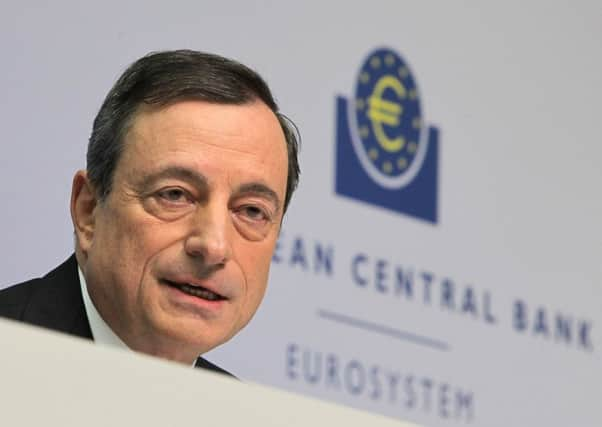George Kerevan: Eurozone QE | mobile moves


OK, some £46 billion of bond purchases every month till next September is the minimum I’d have expected to convince markets the European Central Bank (ECB) is serious about reflating the eurozone. Yet ECB president Draghi has faced down monetary conservatives in Germany and given Europe’s unemployed cause for hope.
What happens next depends on how Germany reacts to Draghi’s little insurrection on behalf of the debtor states of southern Europe.
Advertisement
Hide AdAdvertisement
Hide AdThe anti-European Union AfD party (Germany’s Ukip) denounced the ECB for making hardworking Germans fund Mediterranean profligacy. The far-left Die Linke said Draghi was plundering the savings of the poor to make the “super-rich even richer”. The Bavarian Social Christians (a key component of chancellor Angela Merkel’s ruling party) warned that “unlimited purchases of sovereign bonds” could “bring down the euro”.
SUBSCRIBE TO THE SCOTSMAN’S BUSINESS BRIEFING
• Get the latest business headlines from a variety of news sources emailed to your inbox each morning
However, Merkel and the ever-cautious Bundesbank seem prepared to give the ECB its head for the moment. After all, no-one but Mario Draghi has a plan to counter Europe’s slide into a Japanese-style secular deflation. But he is on a very short leash. Germany only gave up the sacred deutschemark on the implicit condition the Bundesbank would have a veto on ECB policy. This week Draghi tore up that tacit agreement.
He had better deliver.
The fact that Germany and its ever vigilant constitutional court are breathing down his neck may have made Draghi too cautious.
Firms in the eurozone are cutting prices at the fastest rate in five years, according to data published yesterday. Yet, in relative terms, the ECB is pumping in a third of the extra liquidity that the US Fed or the Bank of England provided.
My guess is that the ECB’s version of QE might have worked five years ago, but is probably too modest now given global commodity prices are in free-fall.
Knight moves for O2 to checkmate rivals
The number of players in the UK telecoms industry is about to shrink – provided the competition authorities agree.
The wonderfully named Hutchison Whampoa (owned by Hong Kong multi-billionaire Li Ka-shing) is buying O2 from Telefonica for £10.25 billion, to bundle with its existing Three Mobile network. That will make it the biggest mobile service provider in the UK, eclipsing EE.
Advertisement
Hide AdAdvertisement
Hide AdMeanwhile, BT (which once owned 02) is buying EE for some £12.5bn, to create a mobile outlet for its shift into selling content.
That leaves Vodafone looking for a partner, possibly Sky. (I hope someone in the telecoms business is good at chess.)
Li, a knight of the realm who, at age 86, is still on a buying spree, is funding the O2 purchase with a bank loan.
He has recently shuffled his corporate pack to separate out his risky Chinese mainland real estate holdings – a sensible defensive move that has increased the share price of his core companies.
However, I remember that BT originally sold off O2 in order to pay down excessive debt.
Would three big telecoms providers be enough to ensure sufficient competition to protect the consumer and encourage innovation?
Ofcom, the regulator, has been keen to keep four players in the league, the norm in Europe.
But given Ofcom’s usual timidity I’d guess Li will get the thumbs up to buy O2 in return for some vague promises of good behaviour.